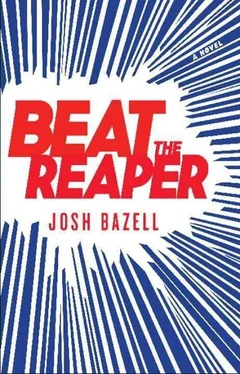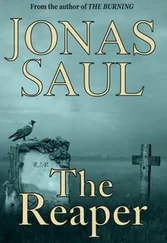I figured all told I would prefer Marion. But I didn’t worry about it too much, because the choice of whether you spend the rest of your life at Marion or at Leavenworth is not one you get to make. Bizarrely, it’s not one anyone gets to make. It gets decided randomly, on the basis of available beds. [47] A Brooklyn wiseguy once told me you could choose Leavenworth by having a bed there “cleared,” i.e., by having someone killed. Sounds like bullshit to me.
And anyway, I was planning to avoid both places. By snitching or whatever else it took.
I was willing to tell the Feds everything I knew, about the mob in general and David Locano in particular. True, I had once loved Skinflick like a brother. His parents had been closer to me than my own parents. Also true, I loved Magdalena so badly that I would have sold the Locanos and anything else I had access to in an instant, for one hour alone with her, anywhere.
I just didn’t know how long to wait. If it turned out that I would somehow walk, it would be crazy to tangle with the mob unnecessarily. But if I waited too long, and got convicted, it would be a lot harder to plea-bargain.
Locano’s guys were smart enough not to threaten Magdalena—or me, for that matter—directly, because they knew that if they did I’d start thinking about how to hurt them, and never stop. But they didn’t have to say much. I was in a cage, and they were out there, where she was. The ones who came to visit mentioned her all the time: “The case is bullshi’. It’s shi’. You’ll be back out wit your girl again. Wha’s her name? Magdalena? Nice name. Gray girl. You’ll be wit her in no time. We’ll sen her somin.”
Magdalena herself came to visit me four times a week.
Visitation rights are looser in jail than they are in prison—because Hey, you’re innocent! —and apparently they’re looser in Fed than they are in State. You’re not allowed to touch, but you can sit at opposite ends of a long metal table that has no divider, as long as the prisoner keeps his hands in sight on the tabletop. The visitor can keep her hands wherever, and do things to herself with them while you talk, and after a few weeks you don’t even think about the guards being there when this happens. And if you and she are fast you can stand at the same time, and you can kiss her or she can get her fingers into your mouth before you’re pulled apart and she’s thrown out and you get searched by a dentist. Because the warning that she won’t be allowed back turns out to be bullshit. And the guards, those sorry derelicts, are all willing to lie for you.
I loved Magdalena more and more with each visit and with each of her strange, formal letters. “In the quartet they keep telling me I am playing out of time. I am, because I am thinking about you. But it makes me play better, not worse, as I am so much more alive then, so I do not feel I am letting them down. I play best when I play from my heart, and you are my heart, I love you.”
If that feels to you like one of those fucked-up prison romances where the obese woman writes to the celebrity wife-murderer, I don’t care. It saved my life, and my sanity. Her visits blotted out the squalidness of that shithole for days after she left.
Magdalena talked to Donovan more than I did. After he suggested to both of us separately that we might want to get married in case she was subpoenaed, [48] She could still have been compelled to testify about crimes committed prior to the marriage, but juries still think it’s illegal, so prosecutors don’t like to do it.
Magdalena told me that of course she would. That she would do anything.
I told her I didn’t want to, because I wanted to marry her for real. She said, “Don’t be stupid. We’ve been married for real since October Third.”
I’ll leave that one for you to figure out. It would be like trying to describe what the surface of the sun looks like.
Not that anyone seriously thought Magdalena would be subpoenaed. She would break a jury’s heart like that .
She brought me books, which were hard to read because of the noise. Then she brought me earplugs.
And, without telling me, she began the process of applying to become a Federal prison guard, so she’d have a chance in hell of being near me if things went badly.
Early in the summer of 2000, I was taken out of my cell and brought to an office in the FMCCNR I’d never been to before. That itself was not unusual, since every couple of weeks or so there was an “initial appearance” or “pretrial hearing” or whatever, to verify things like that I was who I claimed to be or who the Feds claimed I was, and that a crime had been committed at all. But this time the guard left me in the office alone and went and stood outside. Which felt extremely strange, even though I had wrist-waist and ankle cuffs on.
I immediately searched for a phone to call Magdalena. There wasn’t one. The wooden desk, like the wooden bookshelves, was empty. The wooden chair was the old slat-back kind. Out the window there was a ledge, and if I’d wanted to escape that would have been a good time for it. For a minute or two I considered it, and I was still looking out the window when the door opened behind me and Sam Freed came in.
He was in his late sixties then, immediately likable in a wrinkled gray suit. When I started around the desk he held a hand up and said, “Sit.” So I took the desk chair and he pulled over one of the ones along the walls.
“I’m Sam Freed,” he said. I’d never heard of him.
“Pietro Brnwa.” There was something about him that made you feel, even in your orange jumpsuit and leg irons, like a human being.
“I’m with the Justice Department,” he said. “Though I’m mostly retired now.”
That’s what he said. He didn’t say, for instance, “I invented WITSEC,” though that would have been true. He didn’t say, “I broke the mob’s back, and the people I gave immunity to have the lowest recidivism rates ever seen.”
Of course, he also didn’t say that he was one of the most loathed people in law enforcement. Because sure, he’d struck the mafia a deathblow, but only at the cost of setting a bunch of scumbags up with new lives, which most cops and even Feds found unforgivable.
He was Jewish, of course. Who else would fight that hard for justice in a way guaranteed to make him a pariah? His father had worked the Fulton Street Fish Market, paying 40 percent off the top to Albert Anastasia.
Like I say, though, at the time I had never heard of him. “Huh,” I said.
He said, “I heard about you from Baboo Marmoset.” [49] “Baboo,” which is a common nickname for the youngest male of an Indian household, obviously isn’t Prof. Marmoset’s real first name. His real first name is Arjun.
“I don’t know who that is,” I said.
“Indian kid. Doctor. Long hair. He did your physical a couple of months ago.”
“Oh, right.” I remembered him now, though only someone of Freed’s generation would say he had long hair. Marmoset had talked on the phone and done my paperwork at the same time he’d examined me. Then he’d said, “You’re fine.” I was pretty sure that was the extent of our interaction.
“I’m surprised he remembered me,” I told Freed. “He seemed a bit distracted.”
Freed laughed. “He always does. God knows what he’d be capable of if you could get his attention. I’ll tell you a story.”
Freed put his feet up on the desk. “My wife and I like to go out to dinner theater,” he said. “These things at a Chinese restaurant where some actors stage a crime and you have to solve it. It’s ridiculous, but it feeds us and it feeds the actors, so there you have it.
Читать дальше










